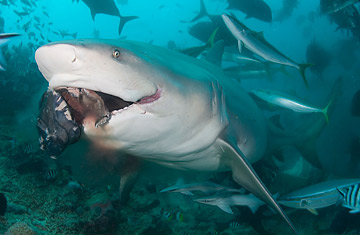
A bull shark feasts in Shark Reef, Pacific Harbor, Viti Levu.
No one goes on an adventure tour with the thought that he won't make it back alive. The whole point is to push the envelope and live to tell the tale. It's unclear what Markus Groh thought when he signed up for a late February dive that could put him face-to-face with killer sharks spanning 18 feet in length — without a cage to separate him from the man-eaters. He surely didn't expect to end up dead. But the 49-year-old attorney from Austria, died on Feb. 24 after being bitten in the leg while swimming with the sharks in the Bahamas.
Every year hundreds of people die while living life to the fullest — battling white-water rapids, climbing the world's tallest mountain peak, descending to the depths of the ocean. These extreme sports are inherently dangerous and you take your chances. Or do you? "One of the things about these high-risk activities is that if you're going to participate in them you assume a certain kind of risk," says Prof. Lyrissa Lidsky, who teaches tort law at the University of Florida. In the case of Groh, the question is whether the tour operator failed to use reasonable care when he took a group of tourists diving for sharks without using cages. "Is the thing that killed him something that you normally associate with shark watching?" Lidsky asks, "Or, is it something that could have been avoided had the company used reasonable care?"
There are other factors to consider. "It's the first fatality that we have reported involving a dive where the host is specifically bringing in the animal by chumming [feeding the sharks with chopped up fish]," says George Burgess, director of the International Shark Attack File at the University of Florida. "Putting people in the water with these large animals is a risk. It's not a matter of whether an attack like this was going to happen, it was when."
Diving with dangerous sharks without a cage appeals to the thrill seeker, Burgess says, adding, "It is taking further and further steps farther and farther toward danger." The tour, provided by Scuba Adventures of Riviera Beach, Fla., promoted its dives as great hammerhead and tiger shark expeditions. Although the company issued a blanket "no comment" when contacted by TIME, its literature made clear the divers would be in the water without any cages while the sharks were being fed — a practice banned in Florida.
"To insure the best results we will be 'chumming' the water with fish and fish parts," the Scuba Adventures website stated. "Consequently, there will be food in the water at the same time as the divers. Please be aware that these are not 'caged' dives, they are open water experiences. We will have crew members in the water at all times to insure diver safety."
Rodney Barreto, chairman of the Florida Fish and Wildlife Conservation Commission, maintains there's no way the crew could ensure the safety of the divers. "That's not a controlled environment," Barreto says. "There's no way you know whether a three-foot shark or a 13-foot shark is coming." In 2001, the commission outlawed the practice of fish feeding off the coast of Florida. Because the tour operator could not legally attract sharks with chum in the state where he is based, he went to the Bahamas, Barreto says. "We're not discouraging people to go diving," Barreto adds. "We're telling them to be responsible and obey the law. One of the reasons they went to the Bahamas is they were doing something outside the law."
Jason Margulies, a prominent maritime attorney in Miami, agrees with Barreto. "It seems to me, that this guy was trying to sidestep the Florida ban on shark feeding by proceeding to Bahamian waters," Margulies says. "He knew the dangers. He was going the extra mile to do this." A statement from the Bahamas Ministry of Tourism said in part, "Shark feeding excursions are legal in the Bahamas."
Whether Groh's family could prevail if they took the case to civil court depends a lot upon what law applies — Florida law or federal admiralty law. According to Margulies, admiralty law would apply if the vessel transported passengers between a port in the United States and a foreign country. The federal law would allow a negligence claim; Florida law would bar such a claim. Florida holds that waivers signed by a person participating in high-risk activity such as skydiving or shark watching are valid because they are knowingly engaging in risky activity, Margulies says.
If Florida law prevails, all recourse may not be lost for Groh's family. Lidsky explains that a lot depends upon the wording of the waiver. Sometimes a court will void the contract as a matter of public policy because the contract fails to spell out the risk, she says.
Still, she says, the best bet is to avoid risky behavior in the first place. But if the thrill seeker in you won't allow for that, at a minimum check out the tour operator's safety record and whether the company adheres to proper safety standards. This particularly applies when traveling abroad. Don't take for granted that a tour operator in a foreign country is going to apply the same safety standards as regulated in the United States, she says. Lastly, you may win your lawsuit but collect nothing because the tour operator either has no assets or is uninsured, she adds. Then again, if you want to see a shark close up, you just might want to visit an aquarium.
